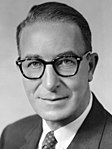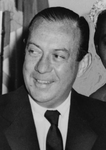The selection of the Democratic Party's vice presidential candidate for the 1956 United States presidential election occurred at the party's national convention on August 16, 1956. Former presidential candidate and Tennessee's Senator Estes Kefauver defeated Massachusetts' Senator John F. Kennedy.
| ||||||||||||||||||||||||||||||||||||||||||||||||
All 1,366 delegate votes of the Democratic National Convention 686 1/2 delegate votes needed to win | ||||||||||||||||||||||||||||||||||||||||||||||||
|---|---|---|---|---|---|---|---|---|---|---|---|---|---|---|---|---|---|---|---|---|---|---|---|---|---|---|---|---|---|---|---|---|---|---|---|---|---|---|---|---|---|---|---|---|---|---|---|---|
| ||||||||||||||||||||||||||||||||||||||||||||||||
| ||||||||||||||||||||||||||||||||||||||||||||||||
Background
editSenator John Sparkman, who was the party's vice presidential nominee in 1952, was mentioned as a possible presidential candidate and later became the head of Alabama's delegation to the national convention, but did not attempt the presidential or vice presidential nomination.[1][2]
On July 9, Governor Frank G. Clement, who was speculated as a possible vice presidential candidate, was selected to give the keynote address at the national convention, but he stated that he had no intention of seeking the vice presidency.[3][4]
Former Massachusetts Governor Paul A. Dever stated that although Kennedy was not an active candidate he was in the running for the vice presidential nomination and that the Massachusetts, Missouri, Ohio, Michigan, and New Jersey delegations would support him. Senator Spessard Holland stated that a Stevenson-Kennedy ticket would easily carry Florida, and other Kennedy supporters stated that having a Catholic vice presidential nominee would guarantee 132 electoral votes along with those from the Solid South.[5][6][7]
California Attorney General Pat Brown came out in support of an open vice presidential ballot and that Senators Hubert Humphrey, John F. Kennedy, Al Gore Sr., and Governor Clement were excellent choices.[8]
Balloting
editAfter winning the presidential nomination, Adlai Stevenson II announced that he would allow the convention delegates to choose his running mate and did not support any candidate.[9] Governor W. Averell Harriman, who had received the second highest amount of delegates on the presidential ballot, also announced that he was not interested in the vice presidential nomination.[10]
On August 16, 1956, the vice presidential ballot started with multiple Southern favorite sons being supported on the first ballot.[11] The Southern delegations planned to deny Estes Kefauver a majority on the first ballot, due to his anti-segregation views, and then to unify behind an acceptable candidate. Kefauver's home state, Tennessee, supported Senator Al Gore Sr. on the first ballot and then realigned its support to Kennedy on the second and third ballots.[12]
After initially leading on the first ballot Kefauver fell behind Kennedy on the second before receiving a majority on the third ballot after Gore withdrew and endorsed him, resulting in Kefauver in first place and Kennedy in second.[13] Governor Orval Faubus, who had opposed Kefauver's nomination, stated that his nomination "leaves us with a lot of hard work to do before November".[12]
Results
edit| Vice Presidential Balloting | |||||||
|---|---|---|---|---|---|---|---|
| Candidate | 1st (Before Shifts) | 1st (After Shifts) | 2nd (Before Shifts) | 2nd (During Shifts) | 2nd (After Shifts) | Unanimous | |
| Kefauver | 466.5 | 483.5 | 551.5 | 551.5 | 755.5 | 1,372 | |
| Kennedy | 294.5 | 304 | 618 | 648 | 589 | ||
| Gore | 178 | 178 | 110.5 | 80.5 | 13.5 | ||
| Wagner | 162.5 | 162.5 | 9.5 | 9.5 | 6 | ||
| Humphrey | 134 | 134.5 | 74.5 | 74.5 | 2 | ||
| Hodges | 40 | 40 | 0.5 | 0.5 | 0 | ||
| Maner | 33 | 33 | 0 | 0 | 0 | ||
| Collins | 28.5 | 1.5 | 0 | 0 | 0 | ||
| Anderson | 16 | 16 | 0 | 0 | 0 | ||
| Clement | 13.5 | 13.5 | 0.5 | 0.5 | 0.5 | ||
| Brown | 1 | 1 | 0.5 | 0.5 | 0 | ||
| Symington | 1 | 1 | 0 | 0 | 0 | ||
| Johnson | 0.5 | 0.5 | 0 | 0 | 0 | ||
| Not Voting | 3 | 3 | 6.5 | 6.5 | 5.5 | ||
References
edit- ^ "Sparkman Is Mentioned For Demo. Nomination". The Progressive Age. April 26, 1956. p. 15. Archived from the original on February 27, 2020 – via Newspapers.com.
- ^ "Little Hugo". The Andalusia Star-News. July 19, 1956. p. 4. Archived from the original on February 27, 2020 – via Newspapers.com.
- ^ "Clement Made Keynoter Of Chicago Convention". Kingsport Times. July 10, 1956. p. 1. Archived from the original on February 27, 2020 – via Newspapers.com.
- ^ "Dixie Democrats Like Clement For No. 2 Spot". Nashville Banner. August 3, 1956. p. 1. Archived from the original on February 27, 2020 – via Newspapers.com.
- ^ "Dever Pushing Kennedy". The Boston Globe. August 8, 1956. p. 15. Archived from the original on February 27, 2020 – via Newspapers.com.
- ^ "Adlai-Kennedy Slate Could Carry Florida Opines Sen. Holland". The Boston Globe. August 8, 1956. p. 15. Archived from the original on February 27, 2020 – via Newspapers.com.
- ^ "Democratic Debating Wisdom Of Catholic on Their Ticket". The Times Dispatch. August 9, 1956. p. 10. Archived from the original on February 27, 2020 – via Newspapers.com.
- ^ "Hopes Still Alive". The San Bernardino County Sun. August 12, 1956. p. 68. Archived from the original on February 27, 2020 – via Newspapers.com.
- ^ "Health issue To Figure In Stevenson Campaign". The Ithaca Journal. August 17, 1956. p. 1. Archived from the original on February 27, 2020 – via Newspapers.com.
- ^ "Health issue To Figure In Stevenson Campaign". The Ithaca Journal. August 17, 1956. p. 1. Archived from the original on February 27, 2020 – via Newspapers.com.
- ^ "Stevenson Leaves Choice Of Running Mate Up To Convention Delegates Alone". The Knoxville Journal. August 17, 1956. p. 1. Archived from the original on February 27, 2020 – via Newspapers.com.
- ^ a b "Arkansas Delegation Backed Kennedy, Lost". Chattanooga Daily Times. August 18, 1956. p. 9. Archived from the original on February 27, 2020 – via Newspapers.com.
- ^ "Kennedy's Three Conventions, Part 1". July 27, 2016. p. 9. Archived from the original on February 27, 2020 – via Newspapers.com.




